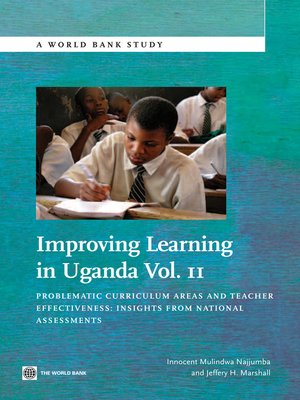Improving Learning In Uganda
ebook ∣ Problematic Curriculum Areas and Teacher Effectiveness — Insights from National Assessments · World Bank Studies
By Innocent Mulindwa Najjumba

Sign up to save your library
With an OverDrive account, you can save your favorite libraries for at-a-glance information about availability. Find out more about OverDrive accounts.
Find this title in Libby, the library reading app by OverDrive.



Search for a digital library with this title
Title found at these libraries:
| Library Name | Distance |
|---|---|
| Loading... |
The Uganda school system has expanded over the years resulting from mass education reforms at the primary – since 1997, and the lower secondary level – since 2007. This has enabled provision of key inputs to schools by Government which include tuition, trained teachers, school infrastructure, and learning materials. The curriculum for the primary level was also reviewed. However, completion rates and learning outcomes are still low which points to inefficiency and low quality of education provided. Current discourse on education is focused on the need to improve efficiency and quality of education. This study is therefore, an attempt to provide a comprehensive analysis of learning outcomes and teacher effectiveness, drawing from the nationally owned and multi-year assessment data sets for Uganda between 2006-2011.
This book provides some answers to questions like: What are the performance levels of learners over the years? What are the curriculum areas that learners find most difficult as measured by their performance and have these been the same over the years? What determines learners' performance? What is the content knowledge level of the teachers? What are the teacher characteristics that determine learners' performance? How effective are the teachers? Guidance on next steps is also provided.
The main contribution of this book is three fold: (a) It explores learners' performance by curriculum area; (b) It links learners' performance with teachers' competency levels by curriculum content area, making it one of the very few materials available in the Africa region. It therefore, amplifies the importance of focusing on what learners find a problem in the teaching-learning process in the quest for quality. The findings also reveal that teacher effectiveness is very low and efforts to improve instructional methods have to be prioritized by Government; and (c), it provides insights on the various dimensions to the education quality and efficiency challenge that many developing countries are grappling with today, and the depth of analysis that have to be undertaken.







